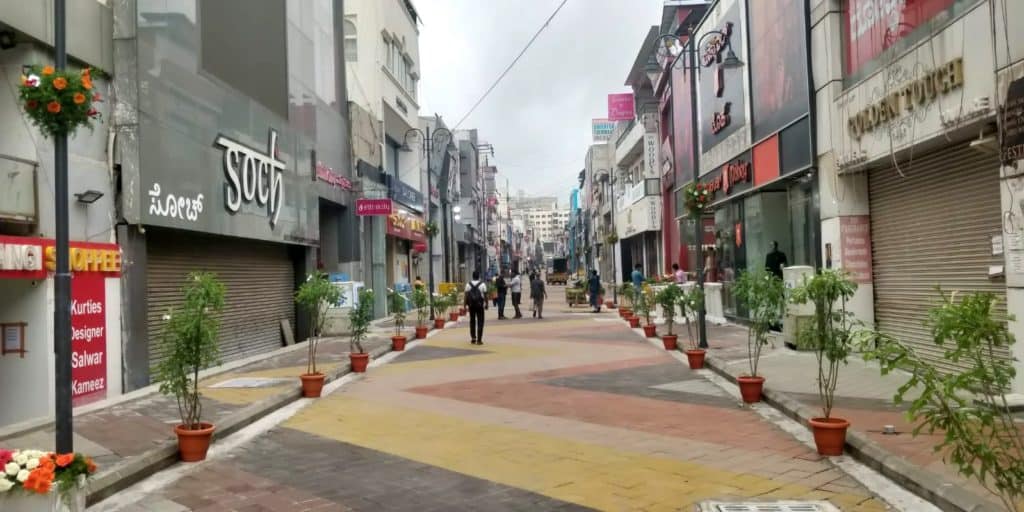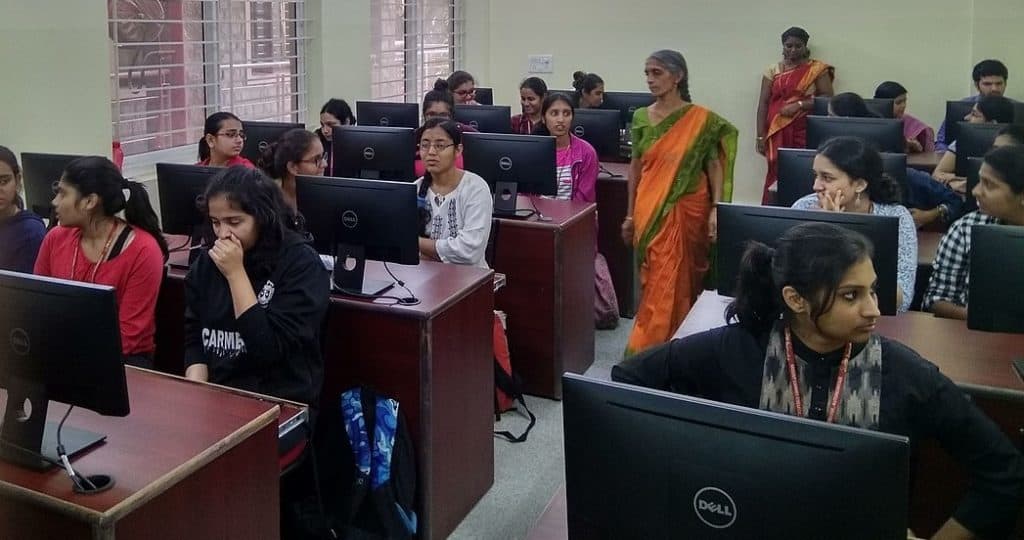Commercial Street makeover
As part of the Smart City project, BBMP has carried out a major exercise in improving the look and feel of Commercial Street. The road is designed to be pedestrian-friendly, though cyclists were miffed at a ‘No cycling’ board. Bengaluru Smart City Ltd has plans for a multi-level parking facility nearby.

The main carriageway has grey and yellow cobblestones and tall wrought iron lamp posts add to the look. Chief Minister BS Yeddyurappa inspected the completed work, with his colleagues and pointed out it was the first time that a chief minister had visited the street. Shopkeepers are relieved the road is finally functional after more than a year of dealing with dug-up roads.
Source: Bangalore Mirror, Times of India
Read more: What does the Rs 1,700 crore ‘Smart City’ plan for Bengaluru involve?
BBMP’s 800-cr health upgrade
The Bruhat Bengaluru Mahanagara Palike (BBMP) has chalked out a master plan for upgrading the existing medical infrastructure at a cost of Rs 800 crore. Recommending revamp of the health infrastructure in a phased manner, the civic body has also submitted a detailed plan to the government. The BBMP has recommended secondary hospitals in every constituency, besides setting up five tertiary hospitals.
Highlights of the master plan include 27 new secondary hospitals, 5 new tertiary care hospitals, 57 new Primary Health Centres, 3,200+ beds in 27 secondary hospitals, and 2,750 beds in 7 tertiary care hospitals. Overall, the requirement works out to Rs 1,000 crore.
Although COVID-19 has seen a decline in the last 10 days, wards reporting the most cases are largely in the outer areas.
On Wednesday, Bengaluru Urban recorded 419 new cases, even as the city witnessed 963 discharges and seven deaths. Bengaluru Urban district tops the list of positive cases, totalling 12,23,226.
Source: Deccan Herald, The Hindu, Indian Express
Post-lockdown challenges
The pandemic has left hundreds of farmers and livestock breeders facing losses. With Bakrid, the festival of sacrifice, the city is witnessing a tepid response to the sale of goats and sheep. The lockdown had spoiled the festive spirit, so, there are hardly any takers, though breeds such as Bannur, Malpura, Sonadi, Mecheri and Jamunapari have flooded the markets.
Meanwhile, the BBMP is keeping a close watch on theatres and cinema halls. The civic body is faced with the challenge of containing any potential third wave, amidst wholesale relaxations in COVID restrictions. With the state government announcing the reopening of higher educational institutions from July 26th, the BBMP has asked colleges to strictly implement discipline.
Cinema halls, multiplexes, theatres, rangamandiras, auditoriums and similar places have opened, limited to 50% of seating capacity, strictly adhering to COVID-appropriate behaviour and SOPs issued by the concerned departments. The night curfew, which was earlier in place from 9 pm to 6 am, has now been reduced to 10 pm-5 am. The lockdown was being relaxed further to help those affected by the restrictions. The government will allow prayers and other rituals to be performed at temples, provided protocols are followed.
Namma Metro evening operations have been extended by an hour till 9 pm, starting from Monday.
Source: Indian Express, The Times of India, Deccan Herald
Read more: Puppy love ends as COVID lockdown lifts
Full marks for II PU students
2,239 students out of over 6 lakh who had registered for the second-year pre-university (II PU equivalent to Class 12) exams this year secured perfect scores of 600 out of 600. Further, 14.29% (95,628) of the total 6,66,497 candidates secured distinction (with scores at 85% or more) while another 3,55,078 of them got first-class marks (60-84%) after the special evaluation process. It was decided to promote all candidates without examinations due to COVID. The evaluation criterion devised to calculate the results took into account 45% weightage from marks scored for SSLC, 45% from I PU marks, and 10% from the internal assessment marks.

However, DPUE (Department of Pre-University Education) has also decided to hold offline exams for candidates unhappy with the score formulated as per the evaluation process this year. For candidates rejecting the results announced today, exams will be held from August 19 to September 3.
Offline classes may start in a phased manner
Offline classes in colleges will resume from July 26 and about 75 per cent of students in the higher education sector in the state have been vaccinated so far.
Offline classes in schools may begin in a phased manner from August, indicated sources in the DPI (Department of Public Instruction). A report by the expert panel headed by the DPI Commissioner will be submitted first to the Primary and Secondary Education Minister.
All teaching and non-teaching staff of state-run, aided and private schools across Karnataka would be vaccinated on priority ahead of resuming classes, as the pandemic’s second wave wanes.
Source: Indian Express, Times of India
Read more: Rules on reopening schools announced in October 2020
Oxford Award
Prerna Wadikar, a student from Bengaluru, has won the Vice-Chancellor’s Social Impact Award at the University of Oxford. It was given to recognise her work in making portable energy access more affordable, by developing a technological model using a lithium-ion battery.
Source: Indian Express
[Compiled by Revathi Siva Kumar]